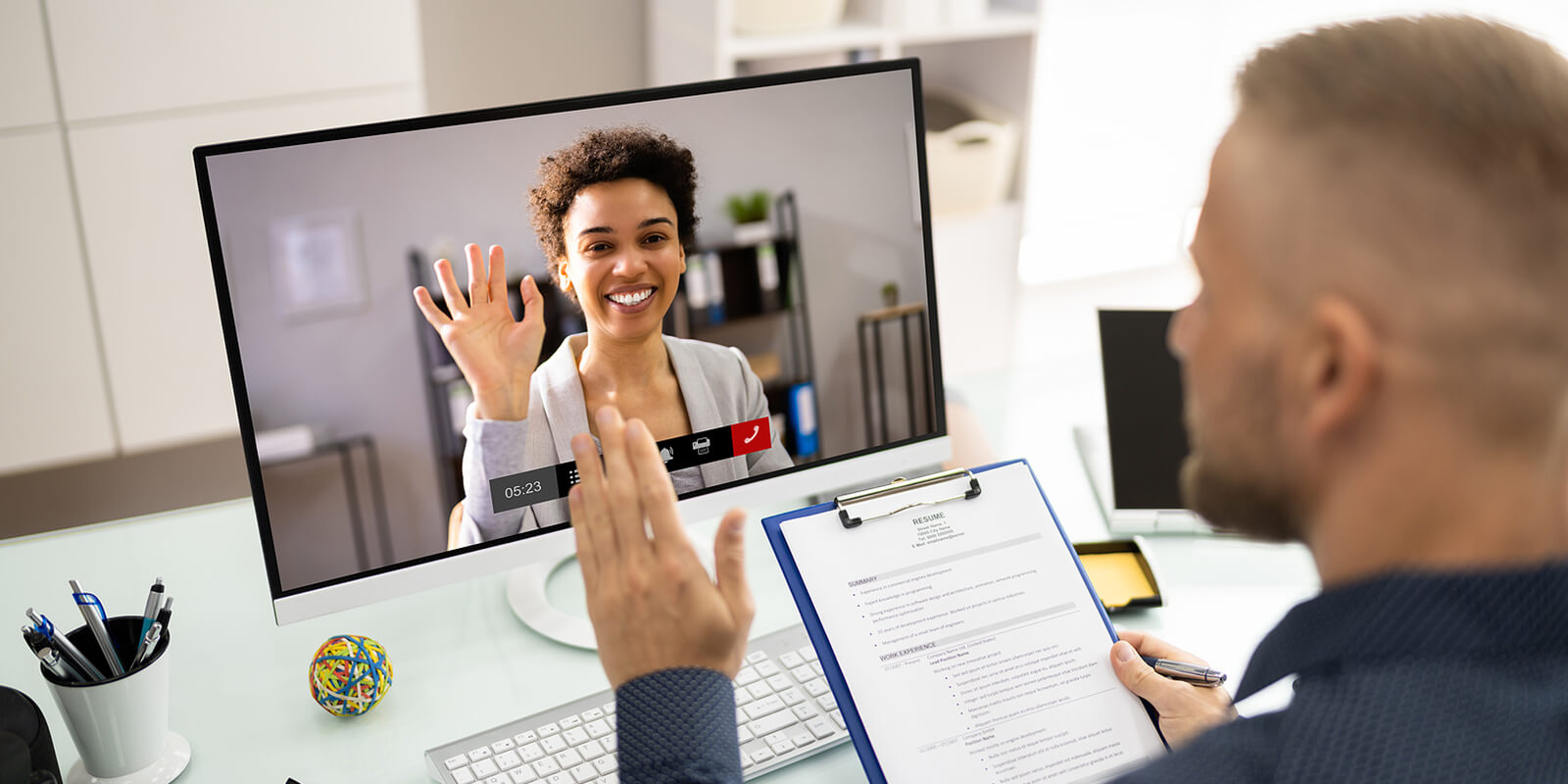Remote job interviews can be nerve-wracking, especially if you’re new to the process. But with the right preparation, you can turn this challenge into an opportunity. Imagine sitting in your home, feeling confident and ready to showcase your skills to a potential employer, all without the need to commute. The world is shifting towards remote work, and with it comes the unique experience of interviewing from the comfort of your own space. But comfort doesn’t mean casual. Just like any in-person interview, a remote job interview demands preparation, professionalism, and poise.
This guide is here to help you navigate the remote interview process with confidence. We’ll walk through the key steps you need to take to make a strong impression, from researching the company to setting up your technology, these tips will help you present yourself as the best candidate for the job. We’ll cover everything from the basics of interview etiquette to advanced strategies for showcasing your skills in a virtual environment. By the end of this guide, you’ll feel empowered and ready to take on any remote interview with ease.
Understanding How Remote Interview Works
Remote job interviews have become increasingly common, especially with the rise of global workforces. Companies are looking for talent that can work effectively from anywhere, which means they often conduct interviews over video calls. This setup can be different from traditional in-person interviews, requiring you to adapt your approach.
For example, instead of focusing on body language and handshake firmness, you’ll need to pay attention to things like eye contact through a webcam and ensuring your voice is clear and strong. Understanding the remote interview landscape means recognizing these differences and preparing for them.
Research the Company and Role
Research is a critical step in any job interview, but it’s even more important for remote positions. You need to understand not only the company’s mission and values but also how they operate remotely. Are they a fully remote team, or do they have physical offices? What tools do they use to communicate? Understanding these details can help you tailor your answers to show that you’re not just a good fit for the role, but also for the remote work environment.
Start by visiting the company’s website and reading up on its history, mission, and recent news. Look for any information about their remote work culture. If possible, reach out to current or former employees to get an inside perspective. This research will not only help you answer questions more effectively but will also give you the confidence to ask insightful questions during the interview.
Set Up Your Technology
Your technology setup can make or break a remote job interview. Imagine you’re in the middle of answering a critical question, and suddenly your connection drops or your audio cuts out. These issues can be frustrating and distracting, both for you and the interviewer. That’s why it’s essential to ensure your technology is reliable and functioning correctly before the interview starts.
Start by checking your internet connection. A wired connection is often more stable than Wi-Fi, so use one if possible. Test your microphone, webcam, and any other equipment you’ll be using. Ensure your camera is positioned at eye level and that you’re well-lit. Poor lighting can make it hard for the interviewer to see you clearly, which can affect the quality of the interaction. Finally, make sure you have any necessary software installed and updated, whether it’s Zoom, Skype, or another video conferencing tool.
Create a Professional Environment
Your interview environment should be quiet, clean, and free of distractions. This shows the interviewer that you’re serious about the opportunity and that you can create a professional workspace, even at home. Choose a spot with good lighting, ideally facing a window or using a lamp to light your face. The background should be tidy and neutral—avoid having clutter or anything too personal in view.
Inform anyone you live with that you’ll be in an interview and need quiet during that time. If you have pets, make arrangements to keep them in another room. It’s also a good idea to have a backup plan in case of unexpected noises or interruptions. For example, if there’s construction noise outside, consider using noise-canceling headphones.
Master the Art of Virtual Body Language
Body language plays a significant role in how you’re perceived during an interview, even in a remote setting. While the interviewer may not be able to see your entire body, your facial expressions, eye contact, and posture still convey a lot about your confidence and interest in the role.
Start by sitting up straight and maintaining good posture throughout the interview. Keep your hands visible when possible, as this makes you appear more open and engaged. Make eye contact by looking directly at the webcam when speaking, rather than at the screen. This gives the impression that you’re looking the interviewer in the eye, which helps build rapport.
Smiling is another powerful tool in virtual interviews. It shows enthusiasm and makes you appear friendly and approachable. However, be genuine—forced smiles can come across as insincere. Practice your virtual body language before the interview by recording yourself and reviewing the footage to see how you come across it.
Practice Common Interview Questions
Preparation is key to answering interview questions with confidence. Start by reviewing common interview questions for the role you’re applying for. Practice your answers out loud, focusing on clarity and conciseness.
When practicing, consider using the STAR method (Situation, Task, Action, Result) to structure your responses. This technique helps you provide clear and detailed answers by describing a specific situation, the task you were assigned, the action you took, and the result of your efforts. This method is particularly effective for behavioral interview questions, which are common in remote job interviews.
For example, if asked about how you handle tight deadlines, you might say, “In my previous role, I was responsible for delivering a major project under a tight deadline (Situation). My task was to coordinate the team and ensure that all deliverables were completed on time (Task). I organized daily check-ins and adjusted our workflow to prioritize critical tasks (Action), which allowed us to complete the project two days ahead of schedule (Result).”
Prepare Questions for the Interviewer
Asking thoughtful questions during the interview shows that you’re genuinely interested in the role and the company. It also allows you to gather important information about the job and the company’s remote work practices.
Consider asking about the company’s expectations for remote workers, the tools they use for communication and project management, and how they support remote employee development. For example, you might ask, “Can you tell me more about how the team collaborates on projects remotely?” or “How does the company support remote employees in their professional development?”
Avoid asking questions that could easily be answered by reading the company’s website or job description. Instead, focus on questions that will give you deeper insights into the company’s culture and how they manage remote teams.
Dress the Part
Even though you’re interviewing from home, it’s important to dress professionally. This not only helps you make a good impression but also puts you in the right mindset for the interview. Dressing the part signals to the interviewer that you’re taking the opportunity seriously.
Choose clothing that you would wear to an in-person interview for the same role. Avoid overly casual attire, even if the company has a relaxed dress code. Solid colors are often a safe choice, as patterns can be distracting on camera. Also, make sure your clothing contrasts with your background to avoid blending in.
Test Your Setup and Do a Practice Run
Before the day of the interview, test your entire setup by doing a practice run. This includes checking your internet connection, audio, video, and lighting. Consider asking a friend or family member to do a mock interview with you to simulate the experience.
During the practice run, take note of any potential issues, such as lag in your internet connection or poor lighting, and address them before the interview. This preparation can help reduce anxiety on the day of the interview, as you’ll know that everything is working correctly.
Handling Technical Difficulties
Despite your best efforts, technical difficulties can sometimes arise during a remote job interview. How you handle these issues can make a big difference in how you’re perceived by the interviewer.
If you experience a technical issue, remain calm and composed. Politely inform the interviewer of the problem and suggest a solution, such as restarting the video call or switching to a phone interview. It’s a good idea to have the interviewer’s phone number or an alternative way to contact them in case of technical issues.
For example, you might say, “It seems like my internet connection is unstable. Would it be okay if we continue this conversation over the phone?” This shows that you’re resourceful and can handle unexpected challenges professionally.
Follow Up After the Interview
After the interview, it’s important to follow up with a thank-you email. This not only shows your appreciation for the opportunity but also keeps you top of your mind with the interviewer.
In your email, thank the interviewer for their time, mention something specific that was discussed during the interview, and reiterate your interest in the role. Keep the email brief and professional, and send it within 24 hours of the interview.
For example, you might write, “Thank you for taking the time to speak with me today. I enjoyed learning more about the company’s approach to remote work, and I’m excited about the opportunity to contribute to the team. I look forward to the next steps.”
Final Thoughts
Preparing for a remote job interview requires careful planning and attention to detail. By understanding the unique challenges of remote interviews and taking proactive steps to address them, you can present yourself as a strong candidate and make a lasting impression. Remember, confidence comes from preparation, so take the time to research, practice, and set up your environment for success. With these tips in mind, you’re well on your way to acing your remote job interview.




